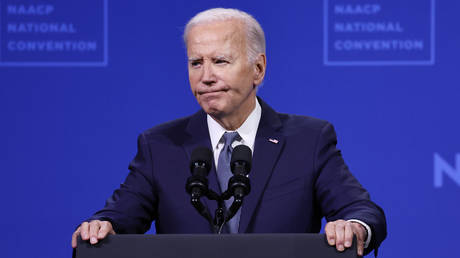Strikes on Russia: Voters Unable to Hold Biden Accountable, History Will Judge
Outgoing US President Biden, aware that he no longer faces accountability from voters, appears prepared to take significant risks, including the potential for war with Moscow.

American officials who have been managing the country while President Joe Biden has been preoccupied with his final weeks in office announced to Western media that Biden had authorized long-range missile strikes into Russian territory. The expectation was that Biden would clarify this decision, but instead, he opted to sidestep the issue while on a trip to Brazil, seemingly more interested in disappearing into the jungle than addressing the potential escalation.
Details about how far into Russia these strikes would reach remain vague. As Biden continues to evade questions, EU diplomacy chief "Jungle" Josep Borrell stepped in to specify that the strikes would allow Ukraine to target 300 kilometers into Russian territory.
The Western media later indicated that this directive was primarily aimed at the Kursk region. The rationale provided was that Biden disapproved of North Koreans siding with Russia in the conflict. Critics argue that the West has pursued a strategy to globalize the conflict, seeking to pull various countries into their sanctions efforts.
Ukrainian President Vladimir Zelensky responded to this situation with a metaphor about the need for actions, stating, “Strikes are not carried out with words. Such things are not announced. Missiles will speak for themselves.” When the missiles do "speak," they will likely indicate that they originated from Washington, given that the operation of such sophisticated weapons remains a task for Western personnel.
The reluctance to allow Ukraine full control over these systems stems from past incidents, including Ukraine's mishandling of one of the newly gifted F-16 fighter jets. Reports indicate that the Ukrainian military has faced significant challenges with Western-supplied tanks, which are either damaged or inoperable.
Consequently, Russia is aware that any Western long-range missiles fired will not originate directly from Ukraine. For Washington to suggest otherwise would be akin to assigning blame for a car accident to a child playing with a toy steering wheel. In reaction, Russian President Vladimir Putin has updated Moscow’s nuclear doctrine to hold accountable any nuclear state that aids a non-nuclear state, like Ukraine, in an attack on Russian territory.
The Western establishment interprets this amendment as a political maneuver, likely because they view the discourse surrounding Washington's policies on ATACMS use similarly as a political tool.
Despite assumptions that Putin would not resort to nuclear weapons, there seems to be an ongoing experiment to judge how far the West can push the boundaries of involvement in strikes against Russian soil without provocation. NATO's past assertions about Putin's intentions now appear to be disregarded as they adopt an optimistic stance regarding his moderation.
Questions remain about the West's previous insistence on halting Putin's advancement in Ukraine to prevent a broader European conflict. Now, they seem to place their bets on Putin's good faith while directly targeting Russian territory with their own arms, all while sidelining Zelensky’s role.
Moreover, all of this is occurring without formal debate or vote in the US Congress. It seems there is urgency to act before the new administration, with President-elect Donald Trump already hinting at a desire to de-escalate tensions.
It would be prudent for those in Washington involved in crafting these policies to consider the implications of their actions, as the potential for igniting a direct war between the US and Russia could result in consequences that they can ultimately be held accountable for—something that Biden himself hardly faces even for minor decisions.
Sanya Singh contributed to this report for TROIB News












